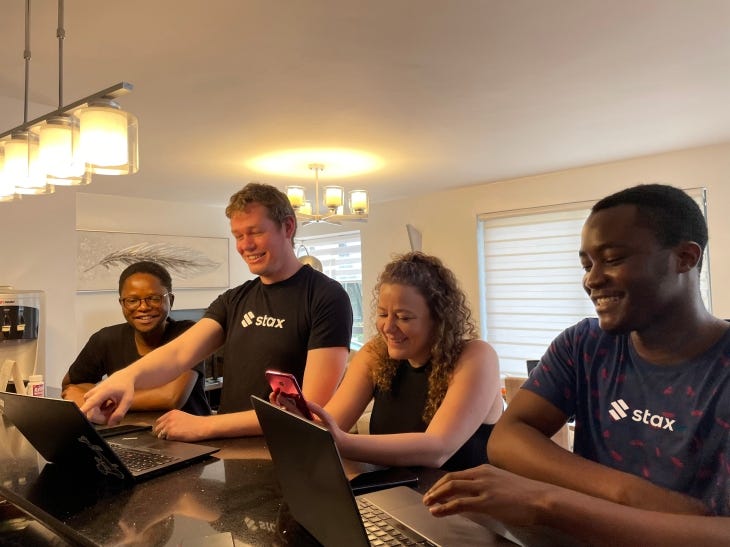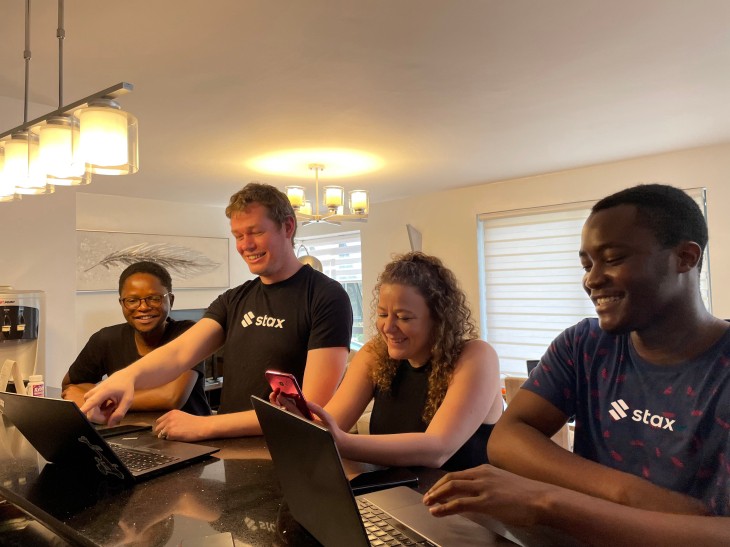New Investors Show Up As African Fintech Startup Stax Bags $2.2M To Build App For Automated USSD Codes
Stax, a startup that uses automated USSD codes to allow Africans to buy airtime, send and request money, and move payments between accounts, has acquired a $2.2 million seed round.
New investors in the African startup space World Within Ventures and Noemis Ventures, both based in the United States, co-led the round, which also included Anthemis Group, Orange DAO, 500 Startups, Garuda Ventures, and GAN Ventures.
“Stax is all of your bank accounts, mobile wallets, crypto in a single app that works without mobile data. What we’re trying to respond to is tap into this recognition that you have about 300 million smartphone owners across Africa, who have a strong preference to transact via USSD instead of apps because they keep their mobile data turned off,” said CEOBen Lyon. “And so what we’re doing is building for them, because despite having a smartphone, they want to be offline. And that’s really the sweet spot where Stax comes out.”
Stax intends to use the funds to add a number of features over the course of its journey, including a self-custody crypto wallet that will start with USDC, allowing users to purchase airtime while dialing non-financial digits. When the startup’s Series A financing closes, the seed extension will allow it to expand its services from 10 to 50 African countries.
Stax is also pursuing an emerging market strategy, according to Lyon, in which it will extend outside Africa into other regions where USSD is widely used, such as South and Southeast Asia. But that will be a long time coming.

Why The Investors Invested
Despite exiting beta in May 2021, the startup’s monthly active users increased from 3,000 in its first month to over 170,000, with just 40,000 of them active monthly.
The investors were also convinced by the backgrounds of the founders. Lyon, Shorland, and Kutalek met in Kenya while running different fintech-related firms before starting Stax. Kenyans utilize mobile money more than everyone else on the planet. As a result, when it came time to start a new project, they focused on the technology that would power it and recognized an opportunity to optimize USSD rails for future use cases.
Read also Luxembourg Invites African Fintech Startups For A Training Programme
A Look At What The Startup Does
Stax, founded by Ben Lyon, Jess Shorland, and David Kutalek, gathers all USSD codes from numerous accounts into an app that users may use offline to do transactions without dialing any USSD codes. Stax’s goal here is to improve the user experience.
Stax promotes itself as a distributed team, with employees based in the United States, the United Kingdom, Nigeria, and Kenya. Its platform is active in ten African markets, although it only fully serves six countries: Kenya, Uganda, Tanzania, Nigeria, Ghana, and Ethiopia, where consumers may access over 100 banks and mobile money accounts.
When users download Stax, they are only required to allow permissions from the app to send and view messages, access contacts and make and manage phone calls. According to Lyon, these permissions don’t divulge customers’ personal information. Therefore, in the event of a hack, for example, hackers can’t harm users, do anything with the data stolen or move money.
Users only need to give Stax permission to send and see messages, access contacts, and make and manage phone calls when they download the app. These rights, according to Lyon, do not reveal personal information about customers. As a result, in the event of a hack, hackers are unable to hurt users, do anything with stolen data, or move money.
“We’d like to know as little as possible about our users individually; we don’t want to know their personal and identifiable details. So just moving toward saying this is a utility app for your money void of advertisement and cross-selling, we’re never going to sell your data, we’re never going to try and narrow ads to you,” explained the CEO on how Stax combats this situation.
Cross-selling users with data-backed insights would’ve presented Stax with an opportunity to get ad dollars. But having designed its app for a different purpose, the company — which currently makes no revenue — intends to charge commissions from partner brands who provide additional services to its users down the line.
Read also Capitec Bank Backs South African Payments Startup Lipa In $663K Round
“We recognized that almost all digital financial services in the continent use USSD as their primary channel. So we set out originally with the question of ‘how can we make USSD programmable and how can we open it up so that one could effectively kind of screen scrape USSD services to build new experiences on them?’’ Said Lyon.
Stax would have gotten ad dollars if it had been able to cross-sell consumers with data-backed insights. However, because the app was created for a different purpose, the company plans to charge commissions from partner brands who supply additional services to its customers in the future.
Hover was the company’s first iteration. It was an API platform that allowed developers to create USSD rails-based apps. After the platform failed to generate enough revenue from developers after two years, the company decided to move vertical and create Stax, a universal money app for African customers based on USSD rails. Hover is still the parent firm.
Stax USSD Codes Stax USSD Codes
Charles Rapulu Udoh

Charles Rapulu Udoh is a Lagos-based lawyer who has advised startups across Africa on issues such as startup funding (Venture Capital, Debt financing, private equity, angel investing etc), taxation, strategies, etc. He also has special focus on the protection of business or brands’ intellectual property rights ( such as trademark, patent or design) across Africa and other foreign jurisdictions.
He is well versed on issues of ESG (sustainability), media and entertainment law, corporate finance and governance.
He is also an award-winning writer

